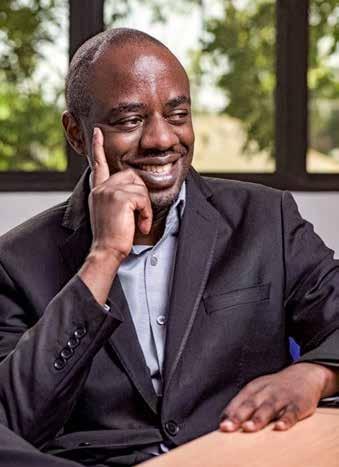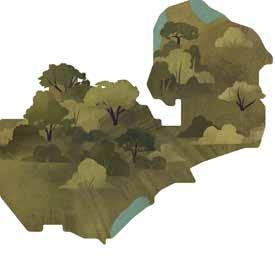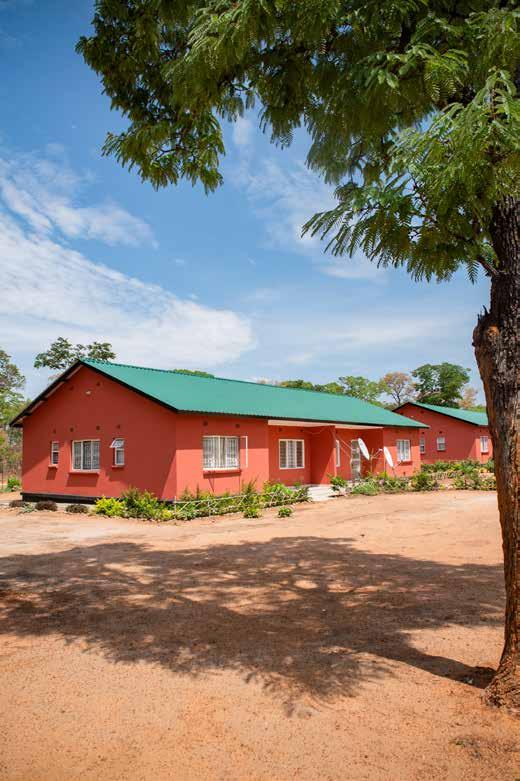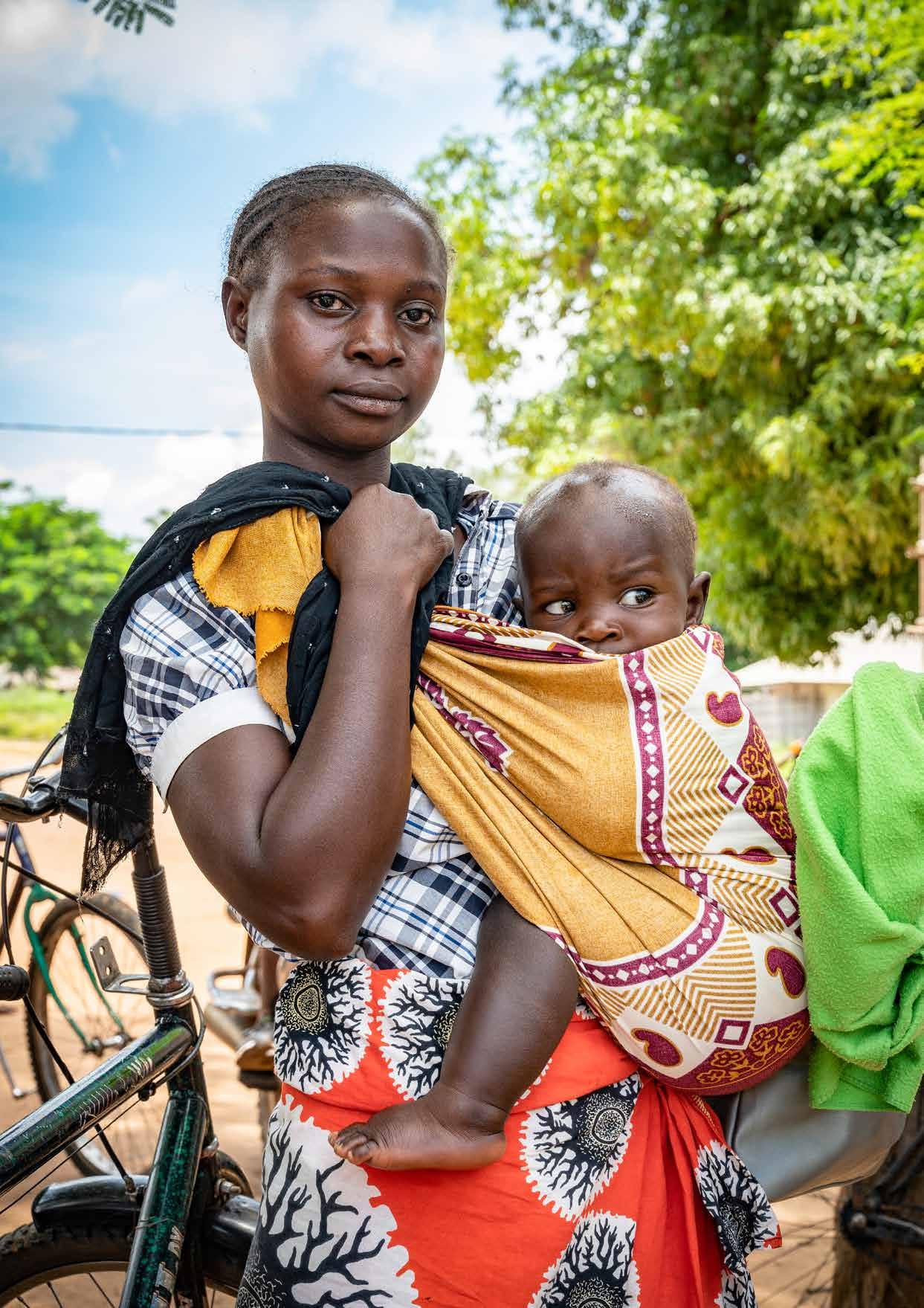
7 minute read
SolidarMed makes a difference
Benatus Sambili, how were the first few months at SolidarMed?
My start as a Country Director in April was exciting. I was very pleased to start in an organisation whose goal is to strenghten health care systems, since that’s just my area of speciality.
Advertisement
How did SolidarMed’s partners react to the change?
That was an odd experience. Part of my introduction programme was to meet with the various SolidarMed partners. This included people from the university and hospitals and government representatives. It came as a surprise to them that the new Country Director of SolidarMed was a local. They asked whether SolidarMed was dissolving or whether I was taking over the position during the pandemic as a transition. Since that time, they’re starting to appreciate me a great deal. They see that the projects are continuing and SolidarMed is also acquiring new projects. Our partners now understand that this is not a transitional solution and they are now taking me seriously.
Where do you see the advantages and disadvantages of a local Country Director?
As an international non-government organisation, we aim to transfer knowledge from the north to the south and back while at the same time establishing sustainability. With a local professional, you promote both. An expat would likely have less difficulty making decisions than a local. The latter may worry more with each decision about how his own community will view and judge him.
Have you already made any changes to how your team works together? If so, what are they?
At the beginning, they all worked on different projects in their own areas. To promote cohesion in the team, I called for a weekly team meeting. During this virtual team meeting, we bring each other up to date on the events in our country programme. The project team in the districts of Malinyi, Ulanga and Mbulu communicates with each other once a month about project implementation. In addition,
there is also the quarterly meeting of the national programme team. Over two days, we discuss what we’ve implemented and learned and what we’re planning next. The goal is to promote exchange in the team and expand our knowledge about our projects.
What do you need to do to improve the quality of medical care in Tanzania?
For good collaboration, things have to be done cohesively, especially when you are working with other organisations and service provision has to be ensured. We can all benefit from good coordination.
In your opinion, what sets SolidarMed’s work apart?
All employees at SolidarMed are part of a service provision system. So, for example, our project leader in Malinyi is a manager and a doctor, but sometimes he also handles a task in the hospital’s technical area. That’s not necessarily the case in other organisations. Employees often only visit the project areas briefly to collect information and then they go back. SolidarMed works differently, thus sustainably strengthening the local health care system.
What are you especially proud of in your team?
For good collaboration, it’s important that everyone understands what everyone else does and how we can assist every single person. By way of example, a programme manager needs
▲ Benatus Sambili is especially proud of the great teamwork on his team. pma
to understand what a clerk does and vice versa. I’m pleased with my team’s eagerness to learn and proud of our great teamwork. ■ ji
Zambia
Mpanshya

Housing to combat shortage of specialists in rural Zambia
Zambia The disparity is significant. 90 percent of trained health care personnel lives in urban areas whereas more than half the population lives in rural ones. A lack of personnel housing is the main reason why health care personnel stay away from rural regions in Zambia. SolidarInvest, the social company for rural living, started in 2011 as a SolidarMed project and is dedicated to construction, maintenance and rental of personnel housing. SolidarMed intends to utilise these resources to combat the shortage of health care personnel in rural areas and ensure that health care is provided. In addition, SolidarInvest evaluates existing personnel housing belonging to health care facilities. These residences are incorporated through long-term management agreements and then upgraded such that they fit in SolidarInvest’s own housing portfolio. The rent is automatically deducted from the health care personnel’s salary. The proceeds are invested in maintenance and the surplus used for newly upgraded housing and hospital expansion projects.
SolidarInvest collaborates with several health care institutions in the districts of Chongwe, Rufunsa, Luangwa, Nyimba, Chinsali and Kawambwa with several health care institutions. As part of another project called “Sustainable Housing for Health” (SH4H), in 2020, SolidarMed built a total of 24 housing buildings which SolidarInvest now manages. Currently, the portfolio comprises 64 residential units and by mid-2021, another 43 will be added. This will raise the anticipated total of managed units to 107. SolidarInvest and SH4H are financed by the Hilti Foundation based in Schaan, Principality of Liechtenstein. ■ ji

► New SolidarInvest personnel housing, Mpanshya, Rufunsa Districtt. gb

► The solar panelling on the roof supplies energy for everyday use. gb

Renovation of the Ifumbo mini hydroelectric power plant in Mbingu
Tanzania Franciscan Sisters of Charity (FSC), a women’s order in Tanzania, has been developing the town of Mbingu since the 1990s. Mbingu now boasts a health care centre, several social facilities and a spiritual centre for more than 20,000 people. In 2008, the order contracted the construction of a hydroelectric power plant which produces up to 850 kilowatts of power. This is fundamental to supply power to the social services in Mbingu, including the health care centre.
In April 2020, part of the concrete pressure line was damaged, resulting in a power outage. This caused the health care centre and other facilities to shut down. Since October 2020, SolidarMed, which has been active in Tanzania since 1999, has supported the restoration of access to basic medical care for the population of Mbingu. The project is financed by the Swiss Agency for Development and Cooperation (SDC) in Tanzania and the women’s order. At the end of 2020, SolidarMed, together with its local partner FSC, was able to begin implementation and replace the damaged component with an extremely resistant steel pipe (particularly with respect to extreme weather conditions) resistant steel pipe. And at the end of January 2021, the project was successfully completed. Thanks to the power supply working again, the vital health care services for around 20,556 people in the Mbingu catchment area are restored. ■ ji

▲ Thanks to the new machine, in the future patients will be able to receive the right treatment within a few hours. ob
Rapid diagnosis of tuberculosis infections at Lugala Hospital
Tanzania In Tanzania, there are many cases of tuberculosis. The Malinyi District is one of the most affected areas in the country. Tuberculosis is traditionally still frequently diagnosed using microscopy. This wastes a lot of valuable time, however. Since 2010, the World Health Organisation (WHO) recommends a GeneXpert device to diagnose tuberculosis. Compared to microscopic testing, this device provides a diagnosis within a matter of about two hours. In addition, this makes it possible to detect pathogen resistance to one of the most important medicines. At the beginning of 2021, with the generous support of the Allschwil Rotary Club, SolidarMed was able to purchase one of these laboratory machines for Lugala Hospital. Combined with the training of health care personnel and village health workers, as well as education campaigns in the surrounding villages, they can diagnose and treat tuberculosis earlier. This contributes to fewer people dying from this disease and fewer new infections. ■ ji
Mbingu

Tansania
Tanzania
Lugala
* Name changed by the editorial staff




